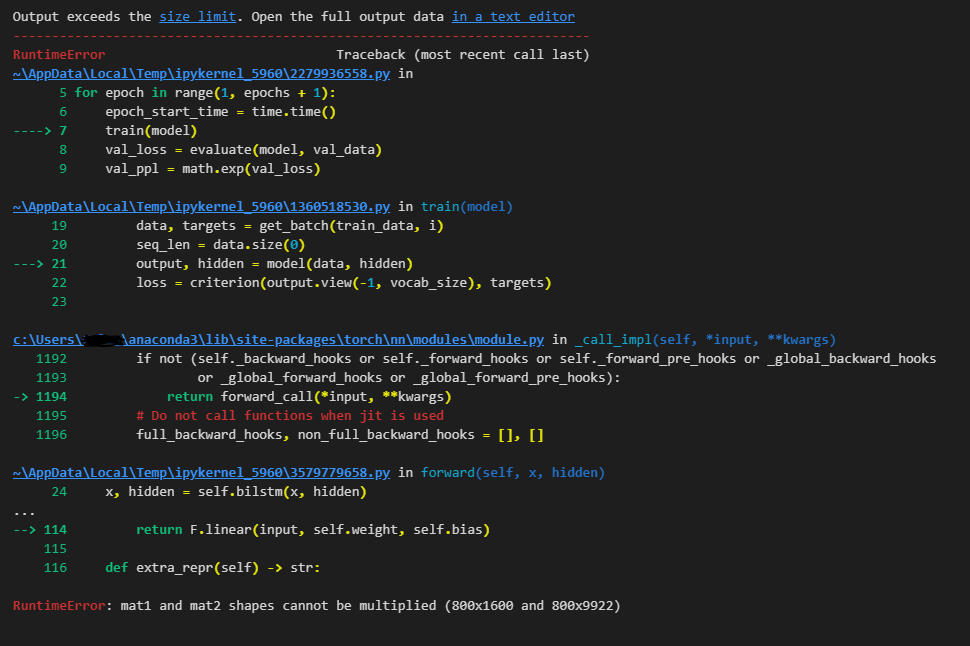Hi, I am trying to do language modelling with Pytorch and am having issues with my model.
train_iter = PennTreebank(split='train')
tokenizer = get_tokenizer('basic_english')
vocab = torchtext.vocab.build_vocab_from_iterator(map(tokenizer, train_iter), specials=['<unk>'])
vocab.set_default_index(vocab['<unk>'])
def data_process(raw_text_iter: dataset.IterableDataset) -> Tensor:
data = [torch.tensor(vocab(tokenizer(item)), dtype=torch.long) for item in raw_text_iter]
return torch.cat(tuple(filter(lambda t: t.numel() > 0, data)))
train_iter, val_iter, test_iter = PennTreebank()
train_data= data_process(train_iter)
val_data= data_process(val_iter)
test_data= data_process(test_iter)
def batchify(data: Tensor, bsz: int) -> Tensor:
seq_len = data.size(0) // bsz
data = data[:seq_len * bsz]
data = data.view(bsz, seq_len).t().contiguous()
return data.to(device)
batch_size = 80
eval_batch_size = 80
train_data = batchify(train_data, batch_size) # shape [seq_len, batch_size]
val_data = batchify(val_data, eval_batch_size)
test_data = batchify(test_data, eval_batch_size)
class LSTM(nn.Module):
def __init__(self, vocab_size, embedding_dim, hidden_dim, num_layers, dropout_rate, tie_weights):
super().__init__()
self.num_layers = num_layers
self.hidden_dim = hidden_dim
self.embedding_dim = embedding_dim
self.batch_size = batch_size
self.embedding = nn.Embedding(vocab_size, embedding_dim)
self.bilstm = nn.LSTM(embedding_dim, hidden_dim, num_layers=num_layers,
dropout=dropout_rate, bidirectional=True, batch_first=True)
self.dropout = nn.Dropout(dropout_rate)
self.linear = nn.Linear(hidden_dim, vocab_size)
if tie_weights:
assert embedding_dim == hidden_dim, 'cannot tie, check dims'
self.linear.weight = self.embedding.weight
self.init_weights()
def forward(self, x, hidden):
# x is a batch of input sequences
x = self.embedding(x)
x, hidden = self.bilstm(x, hidden)
x = self.dropout(x)
pred = self.linear(x)
return pred, hidden
def init_weights(self):
init_range_emb = 0.1
init_range_other = 1/math.sqrt(self.hidden_dim)
self.embedding.weight.data.uniform_(-init_range_emb, init_range_emb)
self.linear.weight.data.uniform_(-init_range_other, init_range_other)
self.linear.bias.data.zero_()
for i in range(self.num_layers):
self.bilstm.all_weights[i][0] = torch.FloatTensor(self.embedding_dim,
self.hidden_dim).uniform_(-init_range_other, init_range_other)
self.bilstm.all_weights[i][1] = torch.FloatTensor(self.hidden_dim,
self.hidden_dim).uniform_(-init_range_other, init_range_other)
def init_hidden(self, batch_size):
h = torch.zeros(self.num_layers*2, batch_size, self.hidden_dim)
c = torch.zeros(self.num_layers*2, batch_size, self.hidden_dim)
return h, c
vocab_size = len(vocab)
embedding_dim = 800
hidden_dim = 800
num_layers = 2
dropout_rate = 0.4
tie_weights = True
model = LSTM(vocab_size, embedding_dim, hidden_dim, num_layers, dropout_rate, tie_weights)
model.to(device)
import copy
import time
criterion = nn.CrossEntropyLoss()
lr = 20.0 # learning rate
optimizer = torch.optim.SGD(model.parameters(), lr=lr)
scheduler = torch.optim.lr_scheduler.StepLR(optimizer, 1.0, gamma=0.95)
def train(model: nn.Module) -> None:
model.train() # turn on train mode
total_loss = 0.
log_interval = 200
start_time = time.time()
hidden = model.init_hidden(batch_size)
num_batches = len(train_data) // bptt
for batch, i in enumerate(range(0, train_data.size(0) - 1, bptt)):
data, targets = get_batch(train_data, i)
seq_len = data.size(0)
output, hidden = model(data, hidden)
loss = criterion(output.view(-1, vocab_size), targets)
optimizer.zero_grad()
loss.backward()
torch.nn.utils.clip_grad_norm_(model.parameters(), 0.5)
optimizer.step()
total_loss += loss.item()
if batch % log_interval == 0 and batch > 0:
lr = scheduler.get_last_lr()[0]
ms_per_batch = (time.time() - start_time) * 1000 / log_interval
cur_loss = total_loss / log_interval
ppl = math.exp(cur_loss)
print(f'| epoch {epoch:3d} | {batch:5d}/{num_batches:5d} batches | '
f'lr {lr:02.2f} | ms/batch {ms_per_batch:5.2f} | '
f'loss {cur_loss:5.2f} | ppl {ppl:8.2f}')
total_loss = 0
start_time = time.time()
best_val_loss = float('inf')
epochs = 50
best_model = None
for epoch in range(1, epochs + 1):
epoch_start_time = time.time()
train(model)
val_loss = evaluate(model, val_data)
val_ppl = math.exp(val_loss)
elapsed = time.time() - epoch_start_time
print('-' * 89)
print(f'| end of epoch {epoch:3d} | time: {elapsed:5.2f}s | '
f'valid loss {val_loss:5.2f} | valid ppl {val_ppl:8.2f}')
print('-' * 89)
if val_loss < best_val_loss:
best_val_loss = val_loss
best_model = copy.deepcopy(model)
scheduler.step()
I am not very experienced with Pytorch but I believe the issue relates the dimensions of the model but I have no idea how to fix the issue. Any help is appreciated.
